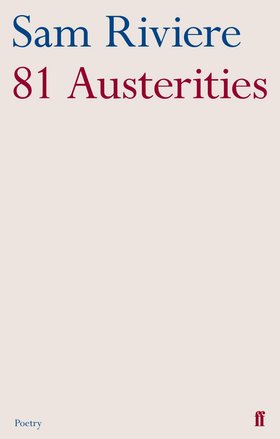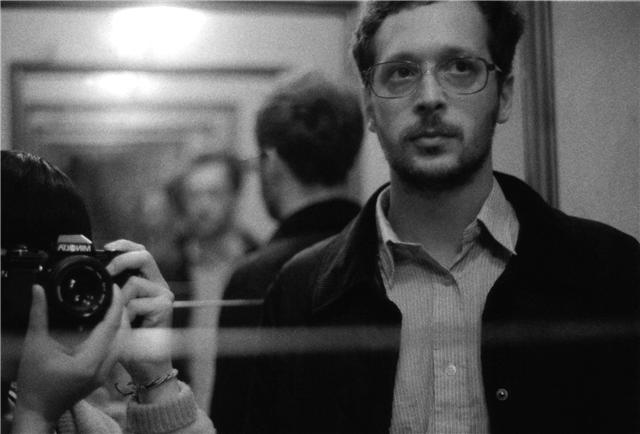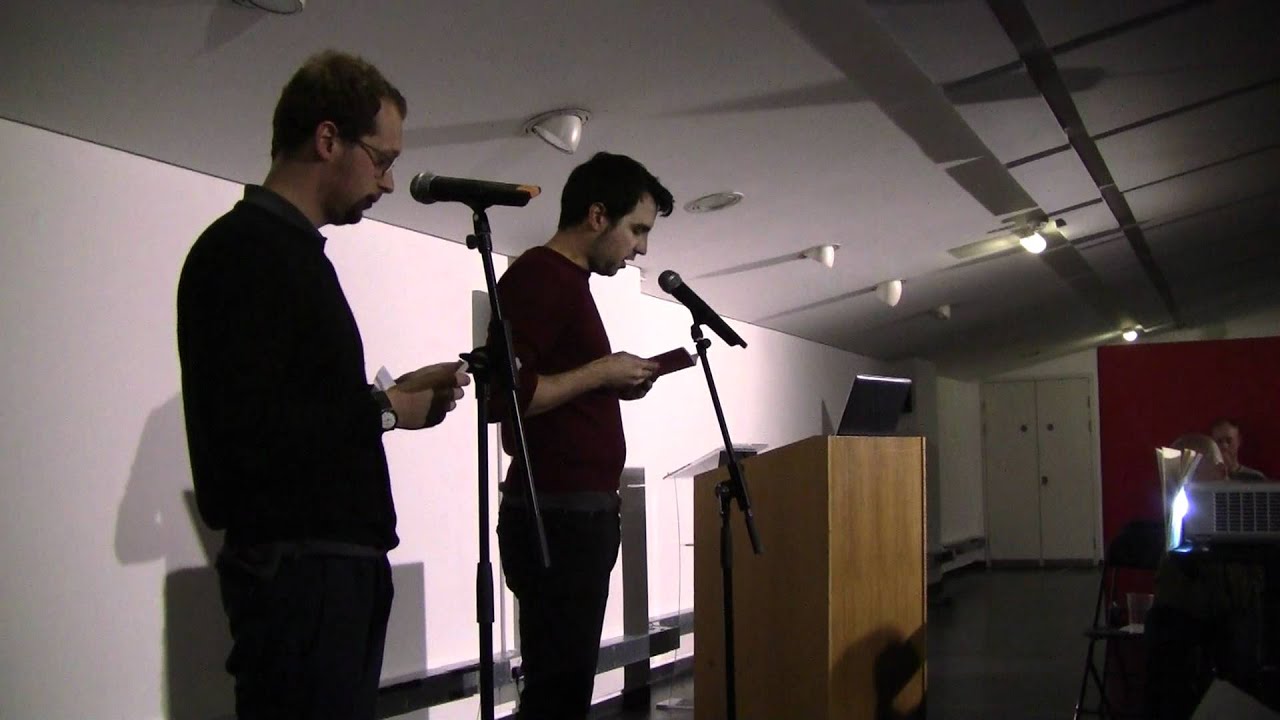Thirty one-year-old Sam Riviere from Norwich is a member of a new generation of British poets – a formidable Brat Pack that includes Luke Kennard, Luke Wright, Joe Dunthorne (of Submarine fame), Jack Underwood and John Osborne. By and large, they eschew clichéd sentimentality in favour of estuary English and Internet argot, wearing their influences unashamedly on their sleeves. John Cooper Clarke, the Black Mountain Poets and the Beats, as well as contemporaries such as Tao Lin and Steve Rogenbuck, are all seminally present in their work. Riviere shares much with these latter figures: riddled with sarcasm, the title of his first book, 81 Austerities, is itself a red herring. Riviere is as concerned with the global economic crisis as he is with getting stuck on the Circle Line going in the wrong direction. (Probably less.)
Nonetheless, today’s political landscape provides an important context. "Do you hear at night the slow creep of history/ Are you feeling depressed", he asks in ‘Help Yourself’ – a poem parodying the tone of myriad self-help guides which flood the market; books symbolising the ideals of 20th century individualism that climaxed in the crash of 2008.
Moreover, it is the movement of history that is entirely absent from Riviere’s worldview. In ‘The Clot’ he declares, "I felt the pain of no longer being a marxist", before concluding, "I want to see clearly each thing taken from me". For this young poet, the grand historical narratives that began in the Enlightenment are over; the guarantees that monetarism or Marx’s teleology once provided have proved false, and history is simply a disordered pileup of disasters. Francis Fukuyama said it best.
And it is for this reason, it seems, that Riviere adopts quotidian language and irony, as it is a pose that preserves his last remaining defence against an onslaught of existential ennui. To revive the language of the Romantics today would be disingenuous. The period of history that they heralded has finished. Conversely, to speak in an ironic register at least suggests the hope that there can still be something that does not belong to the present order, and that change is still possible. This, however, is a dangerous pose – for other poets, such as Rogenbuck, it has led to a gleeful form of Zen nihilism. Riviere, at least, is more circumspect, his pessimism suggesting his discomfort at such quiet acceptance. Speaking before a recent London gig, he revealed more.
Recently, I attended an exhibition where someone was rhetorically complaining about the work, saying, "Surely the point of successful art is its ability to communicate its meaning objectively?" How do you feel about that statement?
Sam Riviere: I suppose that’s an anxiety it’s hard to not have if you’re making art, or writing or making music. It seems more of an acknowledgement that everything is a reference to something else – that everything is an amalgam of references to a certain extent. Everything that you present is either a continuation of something that already exists, or it’s a refusal. The problem – or the opportunity – is how you negotiate those choices.
At the beginning of 81 Austerities you essentially announce that to be a poet in the world today means living on grants and subsidies…
SR: For the majority of contemporary writers, you’re probably going to live on minimum wage. Obviously there are exceptions. And you can teach and do whatever as well. But the same game isn’t happening in poetry as it is in art. In fact it seems impossible to imagine a world in which it did.
Do you think poetry is impervious to capital?
SR: It exists within a bubble, whereas the art market exists in the free market. Money is almost like the subject of modern art because you can’t make it without it. Equally, you can’t write poetry without money, but poetry is different. Poetry doesn’t sell a huge amount. A best-selling poetry book will sell about 3-4,000 copies. Poetry is protected from the concerns of the market. What interests me in writing these poems is how trends in poetry have been artificially perpetuated through that bubble.
Which trends are those?
SR: Autobiographical lyric poetry, and the idea of the poet as someone who is more perceptive – more sensitive – than the average person.
Is that why you use everyday language in your poems?
SR: Yeah, and I’ve tried to go against it. A lot of other stuff coming out now, especially from America, is aggressively refuting the model.
Is this what the section called, ‘The New Sincerity’, is concerned with?
SR: The New Sincerity is weird. I think David Foster Wallace coined it. It was certainly being bandied around ten years ago. At the time it was seen as an emerging school that refuted a grand ironic character novel of the sort Philip Roth might write – but when is writing either sincere or not sincere? It seems impossible to conceive of it as being completely one or the other.
In as much as writing is always a matter of invention?
SR: Yeah. Language itself is ironic – it’s saying something that isn’t there. It’s never going to be proof of anything other than that the poem has been written. Sarcasm can be sincere, like satire.
The title 81 Austerities, seems to refer as much to the recession as it does the coda where you offer a brief digest of each poem. Is this the sort of irony you’re referring to?
SR: Well, there are 81 poems, and each one is an austerity, I suppose. I guess you could say that the title is entirely opportunistic. I recently read an article by a critic called Dan Hoy, who wrote that there’s a distrust of things that are not unsexy enough to be poetry. And I thought that was interesting – that anything that doesn’t have the aura of seriousness can’t be called art or poetry or beautiful. Like advertising.
Can adverts be beautiful?
SR: I think they can be amazing. But I think that if poetry’s task is to interrupt…
Interrupt what?
SR: …interrupt a sense of narrative that one has about a situation, or one’s life, or one’s sense of self – any intrusion of that kind. One intrusion that seems quite valid is that the whole reception of new poetry nowadays seems to anticipate what new poetry is going to be. If it is going to have a political dimension it is going to be left leaning. Well, on the contrary, I’m fairly seduced by capitalism. I’m totally complicit in it. I’m also troubled by it, and that is the impetus for writing.
81 Austerities seems to embody that anxiety, too. Everything seems to be in a state of terminal decline, in which austerity measures – debt bondage – cannot offer stability and all things appear to be prone to some form of disintegration…
SR: Bondage is a very interesting term. Maybe one of the things a poem can do as part of its job is to make one aware of those bondages. When I come to London I feel more aware of bondage and of restriction… It’s as if I’m being moved along by signs, and that the way I make my way through the city is a response to language through street names, place names, names of companies… In terms of writing, to reflect that somehow would be to cut out any grandiose or romantic statements: just respond to it how I feel like I’m responding to it at the time.
In 81 Austerities, there is this overwhelming sense that there are no great narratives left anymore. This feels very much like the territory of WG Sebald, with the exception that – while Sebald revived the language of romanticism to show that the romantic age had ended – you do the opposite with the same effect…
SR: I’ve recently been reading Adorno’s writing on Baudelaire; in a way, Baudelaire’s language is quite traditional but his subject matter is shocking and banal, as in ‘To A Woman Passing By’, in which the woman is wearing funeral clothes, and the narrator longs to know what she’s thinking but he can’t, because all he knows is her image. And it’s that surface impression that’s important – the notion that there is nothing behind it that we can access, and that the only way we can explain it is through language.
Which takes us back to the beginning: the question of art and objectivity…
But, objectivity is not quite right, is it? There are never going to be objective readings. Perhaps it’s difficult for all writers not to feel like they’re writing the same thing over and over again. I guess poets do the same thing as well.

81 Austerities is out now on Faber



